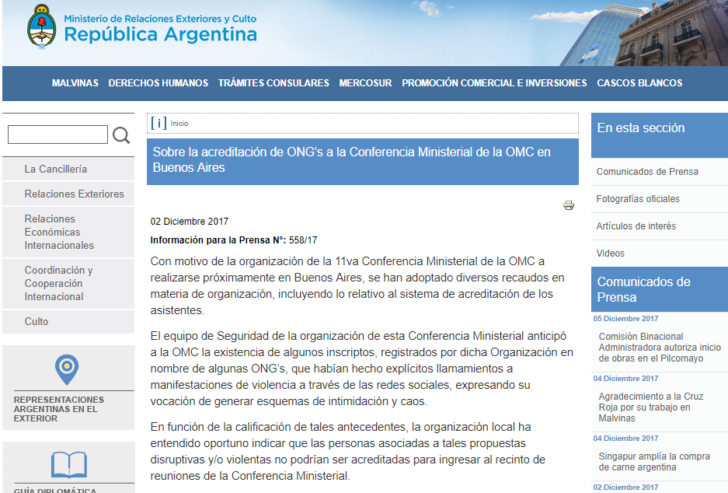On orders from the Argentine government, last week around sixty Argentines and foreigners from previously accredited organizations were denied authorization to participate in the World Trade Organization Ministerial Conference, which will take place in Buenos Aires on December 10-13.
Once this became publicly known, the Foreign Ministry issued a press release asserting that the decision was made because these organizations or persons “had made explicit calls via social media for violent demonstrations, expressing their intent to generate intimidation and chaos.” The text of the press release demonstrates that the government stored, gathered, assessed and/or analyzed personal information.
Today some of these individuals, who decided to come to the country anyway, were delayed at Ezeiza International Airport and later allowed to enter the country after their embassies intervened. This situation indicates that a list was created based on the information gathered and was sent from the Foreign Ministry to the WTO, as well as to the National Migrations Office.
The executive branch’s decisions regarding the participation of certain individuals in the WTO conference affect rights such as to freedom of expression, freedom of opinion and the right to participation. At the same time, Argentina’s National Intelligence Law establishes that no intelligence agency may “obtain information, produce intelligence or store data on persons based solely on race, religious faith, private actions or political opinion, or on adhesion to or membership in partisan, social, trade-union, community, cooperative, welfare, cultural or labor organizations, or for the legal activities they carry out in any sphere of action.”
In order to find out who compiled that list and how, and what records the executive branch holds, today we filed a set of habeas data petitions in support of persons who will not be allowed to attend the ministerial conference, and a request for access to public information. These requests are made in the framework of the constitutional right to habeas data, the law on access to public information, and the personal data protection law.
The habeas data petitions demand that the Foreign Ministry immediately divulge what data it has on the group of persons excluded from the ministerial conference: we requested records, archives, documents, judicial files, paperwork or notes from offices reporting to the national executive branch, particularly the Ministry of Foreign Affairs and Worship, the Ministry of Security and/or the Federal Intelligence Agency.
The request for access to public information solicits the names of the offices and officials who evaluated the accreditations and the criteria they used; what records were considered as the basis for denying and/or revoking accreditation; and what instructions were given to executive branch agencies to gather information and background records on accreditation applicants, in Argentina and abroad, among other issues.
In addition, we filed a preventive habeas corpus on behalf of all those people who may be affected by the administrative authority’s decisions that illegitimately and arbitrarily hinder their entry into Argentina, and above all lead to their detention (retention) in the Ezeiza Airport and/or other points of entry to the country, based on the rejection of their accreditation to participate in the 11th WTO Ministerial Conference. We requested of the judge that these people’s ambulatory freedom be protected, in accordance with the law, and that the administrative authorities be required to explain in detail why these people’s entry into the country is being hindered.

